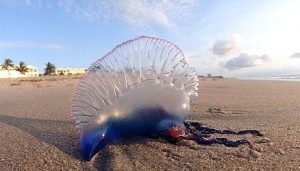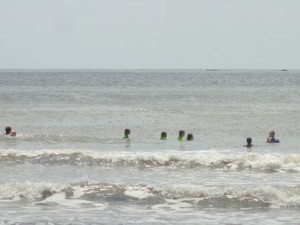A standup paddleboarder enjoys the surf at Corson's Inlet State Park on Monday, near where a Portuguese man o' war was reportedly found on Sunday.
Sightings of TV news vans far exceeded those of Portuguese man o' wars on Monday in Ocean City — a day after a woman reportedly found one of the tentacled creatures on the beach at Corson's Inlet State Park.

A Portuguese man o' war on the beach in Palm Beach, Fla., in this stock photo. Credit: Volkan Yuksel
Ocean City Beach Patrol Operations Director Tom Mullineaux said that none of the lifeguards on duty spotted any man o' war on Monday.
The strange bubble-like animals have no means of self-propulsion, so they're at the mercy of the wind, which was blowing away from the land on Monday.
But because man o' wars deliver an extremely painful sting and because they're rarely found in New Jersey waters, the discovery this month of one in Ocean City, another in Stone Harbor, and a small number on Long Beach Island has caused quite a stir, with news media usually playing "deadly" or "dangerous" in their headlines and promos.

News vans descend upon Ocean City for "man o' war' coverage.
The man o' war's tentacles carry a venom designed to paralyze small fish and prey. But the sting is deadly to humans only in extremely rare cases, usually related to allergic reactions or shock. The sting causes intense pain, leaving red welts on human skin.
Mullineaux said no lifeguard saw the Portuguese man o' war on Sunday, but the woman who discovered it did share a photograph with the guards on the patrol's southernmost beach. The animal was discovered in the state park, which is not patrolled by OCBP.
Mullineaux said the lifeguards will be briefed on Tuesday morning on how to handle potential new sightings of Portuguese man o' wars and potential stings.

FCA surf campers take a plunge on Monday morning.
He said he had seen a man o' war in Ocean City "many moons ago" but not in recent memory.
The spotting of man o' wars here is part of a "transient event that occurs infrequently in New Jersey," according to Gary Buchanan, director of the state Department of Environmental Protection's Office of Science.
In a conference call that included marine biologists Thomas Belton and Joseph Bilinski, Buchanan said the animals were likely floating by in the Gulf Stream and were driven to shore by a combination of currents and wind.
He said the state has received no reports of man o' wars in New Jersey in the last couple years.
In their habitat, the sea creatures can be spotted in groups of 1,000 or more, Buchanan said.
He said it's not uncommon for Gulf Stream rings to spin closer to the continental U.S. and that the north or northeast winds of the weekend likely pushed the animals to shore. The Coriolis effect (based in part on the rotation of the earth) tends to push things to the right or west when winds are out of the north.
Ocean City resident and fisherman George Robinson said he's never seen so many man o' wars so close to shore.
"We’ve had three offshore trips so far this season, and the MOWs are littered all over," Robinson said. "It doesn’t surprise me one has made it to shore."
"Last week, my boys had to go overboard as we picked up a rope on the prop, and I had to get them out as there was a man o' war about 20 yards from the boat."
The tentacles of Portuguese man o' war are typically longer than 30 feet.
Buchanan advises beachgoers not to touch the animals. Even if they're dead, they can still mechanically fire a barb into flesh, he said.
The stinging effect can last from a few hours to two days, he said. If you have a tentacle on your body, don't remove it with bare hands, as that only will compound the problem, he said.
Because man o' wars are not true jellyfish, common palliatives such as vinegar are not effective, he said. Anybody stung is advised to rinse the affected area with lukewarm water.
Because the sightings on the beach have been so few and the combination of conditions that push them to shore so rare, Buchanan advised against being too alarmed.
"We hope that people would not be dissuaded to go into the water," he said.
The winds turned offshore on Monday and are expected to be out of the south and southwest for most of the week.
On the beach Monday in Ocean City, crowds soaked up some gorgeous weather and enjoyed 71-degree temperatures in the surf. The FCA Surf Camp for children went off as usual in the ocean near where the man o' war was found Sunday.
 A Portuguese man o' war on the beach in Palm Beach, Fla., in this stock photo. Credit: Volkan Yuksel
Ocean City Beach Patrol Operations Director Tom Mullineaux said that none of the lifeguards on duty spotted any man o' war on Monday.
The strange bubble-like animals have no means of self-propulsion, so they're at the mercy of the wind, which was blowing away from the land on Monday.
But because man o' wars deliver an extremely painful sting and because they're rarely found in New Jersey waters, the discovery this month of one in Ocean City, another in Stone Harbor, and a small number on Long Beach Island has caused quite a stir, with news media usually playing "deadly" or "dangerous" in their headlines and promos.
A Portuguese man o' war on the beach in Palm Beach, Fla., in this stock photo. Credit: Volkan Yuksel
Ocean City Beach Patrol Operations Director Tom Mullineaux said that none of the lifeguards on duty spotted any man o' war on Monday.
The strange bubble-like animals have no means of self-propulsion, so they're at the mercy of the wind, which was blowing away from the land on Monday.
But because man o' wars deliver an extremely painful sting and because they're rarely found in New Jersey waters, the discovery this month of one in Ocean City, another in Stone Harbor, and a small number on Long Beach Island has caused quite a stir, with news media usually playing "deadly" or "dangerous" in their headlines and promos.
 News vans descend upon Ocean City for "man o' war' coverage.
The man o' war's tentacles carry a venom designed to paralyze small fish and prey. But the sting is deadly to humans only in extremely rare cases, usually related to allergic reactions or shock. The sting causes intense pain, leaving red welts on human skin.
Mullineaux said no lifeguard saw the Portuguese man o' war on Sunday, but the woman who discovered it did share a photograph with the guards on the patrol's southernmost beach. The animal was discovered in the state park, which is not patrolled by OCBP.
Mullineaux said the lifeguards will be briefed on Tuesday morning on how to handle potential new sightings of Portuguese man o' wars and potential stings.
News vans descend upon Ocean City for "man o' war' coverage.
The man o' war's tentacles carry a venom designed to paralyze small fish and prey. But the sting is deadly to humans only in extremely rare cases, usually related to allergic reactions or shock. The sting causes intense pain, leaving red welts on human skin.
Mullineaux said no lifeguard saw the Portuguese man o' war on Sunday, but the woman who discovered it did share a photograph with the guards on the patrol's southernmost beach. The animal was discovered in the state park, which is not patrolled by OCBP.
Mullineaux said the lifeguards will be briefed on Tuesday morning on how to handle potential new sightings of Portuguese man o' wars and potential stings.
 FCA surf campers take a plunge on Monday morning.
He said he had seen a man o' war in Ocean City "many moons ago" but not in recent memory.
The spotting of man o' wars here is part of a "transient event that occurs infrequently in New Jersey," according to Gary Buchanan, director of the state Department of Environmental Protection's Office of Science.
In a conference call that included marine biologists Thomas Belton and Joseph Bilinski, Buchanan said the animals were likely floating by in the Gulf Stream and were driven to shore by a combination of currents and wind.
He said the state has received no reports of man o' wars in New Jersey in the last couple years.
In their habitat, the sea creatures can be spotted in groups of 1,000 or more, Buchanan said.
He said it's not uncommon for Gulf Stream rings to spin closer to the continental U.S. and that the north or northeast winds of the weekend likely pushed the animals to shore. The Coriolis effect (based in part on the rotation of the earth) tends to push things to the right or west when winds are out of the north.
Ocean City resident and fisherman George Robinson said he's never seen so many man o' wars so close to shore.
"We’ve had three offshore trips so far this season, and the MOWs are littered all over," Robinson said. "It doesn’t surprise me one has made it to shore."
"Last week, my boys had to go overboard as we picked up a rope on the prop, and I had to get them out as there was a man o' war about 20 yards from the boat."
The tentacles of Portuguese man o' war are typically longer than 30 feet.
Buchanan advises beachgoers not to touch the animals. Even if they're dead, they can still mechanically fire a barb into flesh, he said.
The stinging effect can last from a few hours to two days, he said. If you have a tentacle on your body, don't remove it with bare hands, as that only will compound the problem, he said.
Because man o' wars are not true jellyfish, common palliatives such as vinegar are not effective, he said. Anybody stung is advised to rinse the affected area with lukewarm water.
Because the sightings on the beach have been so few and the combination of conditions that push them to shore so rare, Buchanan advised against being too alarmed.
"We hope that people would not be dissuaded to go into the water," he said.
The winds turned offshore on Monday and are expected to be out of the south and southwest for most of the week.
On the beach Monday in Ocean City, crowds soaked up some gorgeous weather and enjoyed 71-degree temperatures in the surf. The FCA Surf Camp for children went off as usual in the ocean near where the man o' war was found Sunday.
FCA surf campers take a plunge on Monday morning.
He said he had seen a man o' war in Ocean City "many moons ago" but not in recent memory.
The spotting of man o' wars here is part of a "transient event that occurs infrequently in New Jersey," according to Gary Buchanan, director of the state Department of Environmental Protection's Office of Science.
In a conference call that included marine biologists Thomas Belton and Joseph Bilinski, Buchanan said the animals were likely floating by in the Gulf Stream and were driven to shore by a combination of currents and wind.
He said the state has received no reports of man o' wars in New Jersey in the last couple years.
In their habitat, the sea creatures can be spotted in groups of 1,000 or more, Buchanan said.
He said it's not uncommon for Gulf Stream rings to spin closer to the continental U.S. and that the north or northeast winds of the weekend likely pushed the animals to shore. The Coriolis effect (based in part on the rotation of the earth) tends to push things to the right or west when winds are out of the north.
Ocean City resident and fisherman George Robinson said he's never seen so many man o' wars so close to shore.
"We’ve had three offshore trips so far this season, and the MOWs are littered all over," Robinson said. "It doesn’t surprise me one has made it to shore."
"Last week, my boys had to go overboard as we picked up a rope on the prop, and I had to get them out as there was a man o' war about 20 yards from the boat."
The tentacles of Portuguese man o' war are typically longer than 30 feet.
Buchanan advises beachgoers not to touch the animals. Even if they're dead, they can still mechanically fire a barb into flesh, he said.
The stinging effect can last from a few hours to two days, he said. If you have a tentacle on your body, don't remove it with bare hands, as that only will compound the problem, he said.
Because man o' wars are not true jellyfish, common palliatives such as vinegar are not effective, he said. Anybody stung is advised to rinse the affected area with lukewarm water.
Because the sightings on the beach have been so few and the combination of conditions that push them to shore so rare, Buchanan advised against being too alarmed.
"We hope that people would not be dissuaded to go into the water," he said.
The winds turned offshore on Monday and are expected to be out of the south and southwest for most of the week.
On the beach Monday in Ocean City, crowds soaked up some gorgeous weather and enjoyed 71-degree temperatures in the surf. The FCA Surf Camp for children went off as usual in the ocean near where the man o' war was found Sunday.